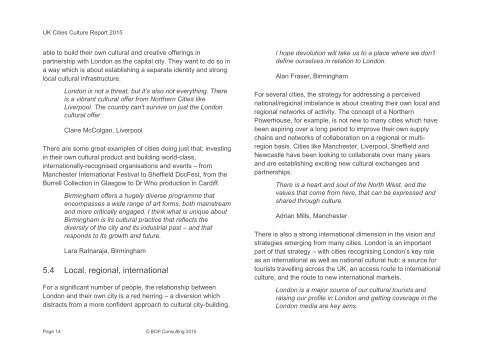UK Cities Culture Report 2015
VuduV
VuduV
You also want an ePaper? Increase the reach of your titles
YUMPU automatically turns print PDFs into web optimized ePapers that Google loves.
<strong>UK</strong> <strong>Cities</strong> <strong>Culture</strong> <strong>Report</strong> <strong>2015</strong><br />
able to build their own cultural and creative offerings in<br />
partnership with London as the capital city. They want to do so in<br />
a way which is about establishing a separate identity and strong<br />
local cultural infrastructure.<br />
London is not a threat, but it’s also not everything. There<br />
is a vibrant cultural offer from Northern <strong>Cities</strong> like<br />
Liverpool. The country can’t survive on just the London<br />
cultural offer.<br />
Claire McColgan, Liverpool<br />
There are some great examples of cities doing just that: investing<br />
in their own cultural product and building world-class,<br />
internationally-recognised organisations and events – from<br />
Manchester International Festival to Sheffield DocFest, from the<br />
Burrell Collection in Glasgow to Dr Who production in Cardiff.<br />
Birmingham offers a hugely diverse programme that<br />
encompasses a wide range of art forms, both mainstream<br />
and more critically engaged. I think what is unique about<br />
Birmingham is its cultural practice that reflects the<br />
diversity of the city and its industrial past – and that<br />
responds to its growth and future.<br />
Lara Ratnaraja, Birmingham<br />
5.4 Local, regional, international<br />
For a significant number of people, the relationship between<br />
London and their own city is a red herring – a diversion which<br />
distracts from a more confident approach to cultural city-building.<br />
I hope devolution will take us to a place where we don’t<br />
define ourselves in relation to London.<br />
Alan Fraser, Birmingham<br />
For several cities, the strategy for addressing a perceived<br />
national/regional imbalance is about creating their own local and<br />
regional networks of activity. The concept of a Northern<br />
Powerhouse, for example, is not new to many cities which have<br />
been aspiring over a long period to improve their own supply<br />
chains and networks of collaboration on a regional or multiregion<br />
basis. <strong>Cities</strong> like Manchester, Liverpool, Sheffield and<br />
Newcastle have been looking to collaborate over many years<br />
and are establishing exciting new cultural exchanges and<br />
partnerships.<br />
There is a heart and soul of the North West, and the<br />
values that come from here, that can be expressed and<br />
shared through culture.<br />
Adrian Mills, Manchester<br />
There is also a strong international dimension in the vision and<br />
strategies emerging from many cities. London is an important<br />
part of that strategy – with cities recognising London’s key role<br />
as an international as well as national cultural hub: a source for<br />
tourists travelling across the <strong>UK</strong>, an access route to international<br />
culture, and the route to new international markets.<br />
London is a major source of our cultural tourists and<br />
raising our profile in London and getting coverage in the<br />
London media are key aims.<br />
Page 14 © BOP Consulting <strong>2015</strong>


